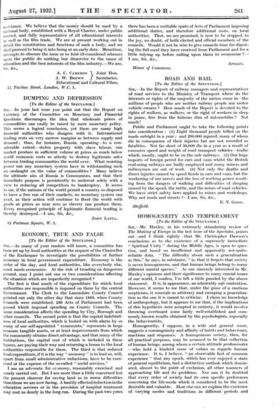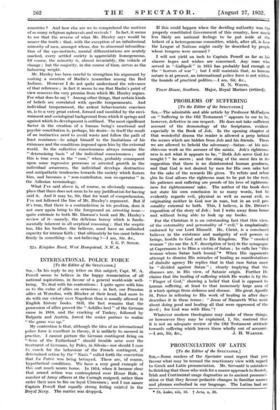HOMOGENEITY AND TEMPERAMENT [To the Editor of the SPECTATOR.] SIR, —Mr.
Huxley, in his extremely stimulating review of The Making of Europe in the last issue of the Spectator, points out—and I think rightly—that Mr. Christopher Dawson's conclusions as to the existence of a supremely immediate " Spiritual Unity" during the Middle Ages, is open to ques- tion, and based on insufficient and apparently not-quite- reliable data. " The difficulty about such a generalization as this," he says, in substance, " is, that it forgets that society is never homogeneous, and that human beings belong to many different mental species." As one sincerely interested in Mr. Huxley's opinions and their significance to many crucial issues of our world, I confess, I'm left a little puzzled by the above statement. It is, in appearance, an admirably safe contention. However, it seems to me that, under the guise of a cautious scepticism, it conceals as arbitrary and sweeping a generaliza- tion as the one it is meant to criticize. I claim no knowledge of anthropology, but it appears to me that, if the implications of this hypothesis were accepted in entirety, it would involve throwing overboard some fairly well-established and com- monly known results obtained by the psychologists, especially the behaviourists.
• Homogeneity, I suppose, in a wide And general sense, suggests a consanguinity and affinity of habits and behaviours, reactions and responses. A homogeneous society, then, for all practical purposes, may be assumed to be that collection of human beings, among whom a certain attitude predominates —who hold a kindred sense of values as regards human experience. It is, I believe, " an observable fact of common experience " that any epoch, which has ever enjoyed a state of general equilibrium, had a distinctive outlook which domin- ated, almost to the point of exclusion, all other manners of approaching life and its problems. Nor can it be doubted that every order of society had its own specific preferences concerning the life-mode which it considered to be the most desirable and valuable. How else can we explain the existence of varying modes and traditions in different periods and countries ? And how else are we to comprehend the motives of so many religious upheavals and revivals ? In fact, it seems to me that the reverse of what Mr. Huxley says would be nearer the truth : that, with the exception of an infmitesimal minority of men, amongst whom, due to abnormal intensifica- tion of the ego-instincts, mental differentiations are acutely sparked, every settled society is appreciably homogeneous. Of course, the minority is, almost invariably, the vehicle of change ; but the majority, in due course of time, serves as the balancing weight.
Mr. Huxley has been careful to strengthen his argument by making a mention of Radin's researches among the Red Indians. However I do not quite understand the relevance of that reference ; in fact it seems to me that Radin's point of view removes the very premise from which Mr. Huxley argues. For what does he say ? Among other things, that certain kinds of beliefs are correlated with specific temperaments. And individual temperament, the ardent behaviourists convince us, is to a very great extent, formed and moulded by the envi- ronment and sociological background from which it springs and against which its development is outlined. The most significant factor in the creation of a human being's emotional and psychic constitution is, perhaps, his desire—in itself the result of an instinctive need to avoid waste and follow the path of least resistance—to adapt himself to the limitations of his existence and the conditions imposed upon him by the external world. So the collective consciousness always remains the " determining basis " of the individual consciousness ; and
this is true even in the " case," when, probably consequent upon some regressive processes or arrested growth in the individual awareness, the individual develops destructive and antipathetic tendencies towards the society which fosters him, and becomes a " non-contributor, non co-operator " in the Adlerian terminology.
What I've said above is, of course, so obviously common- place that there does not seem to be any justification for having Said it. And it may be, Sir, that for want of comprehension, I've not followed the line of Mr. Huxley's argument. But if it's true, that there is a contradiction in his position, does it not once again bring to the foreground an arresting issue— quite extrinsic to both Mr. Dawson's book and Mr. Huxley's review of it—namely, the delicious heresy which is funda- mentally inherent in all sceptical reasoning ; that the sceptic too, like his brother, the believer, must have an unlimited capacity for intense faith ; that ultimately he too must believe firmly in something—in not-believing ?—I am, Sir, &c.,
I. G. P. Swan.
22A Kingdon Road, West Hampstead, N.W. 6.



























 Previous page
Previous page